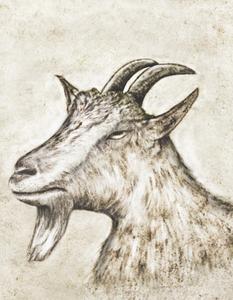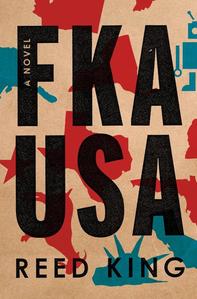
|
|
| image: Rhys Davies | |
Barnaby the Goat was born and raised in San Francisco, Calif., where he spent much of his time eating and reading in the stacks at the local library. He is an avid reader with a sensitive stomach, and books and food remain favorite topics. His later adventures with Truckee Wallace have been documented by Reed King in the novel FKA USA (Flatiron, June 18, 2019).
On your nightstand now:
Unfortunately, I woke up ravenous several nights ago and consumed both the remainders of the nightstand, which I had been savoring for several weeks, and several of the books I had been intending to keep for later. These were: Framley Parsonage by Anthony Trollope; The Portuguese in West Africa, 1415-1670 by Malyn Newitt; and Angels & Demons by Dan Brown. Say what you will, but his stories are absolutely delicious.
Favorite book when you were a child:
When I was a kid, I was for several years constrained to the campus of a vast biomedical center in which I had received operational consciousness. I do remember devouring a large Spanish-English dictionary that one of the lab techs used not infrequently as a doorstop. Pero mi español esta bastante oxidado.
Your top five authors:
Raymond Chandler--his language is so clean on the palette, but the words carry a mysterious aftertaste that lingers pleasurably in the mouth. I adore the Russians, of course, particularly Dostoyevsky--it is a special kind of writer who fills the stomach, and rends the heart in two. Shakespeare is always a pleasure--so dense and chewy. I love Stephen King for a little thrill of flavor here and there. And of course, I'm a fan of Harry Potter. Harry is, in fact, my patronus.
Book you've faked reading:
I admit I found the fourth volume of Proust's Remembrance of Things Past rather dry, not unlike the stale madeleine that I imagine was, by that point, hardening into calcification somewhere on the edges of his memory. Volume Five, however, is a real page-turner, with a pleasurably medicinal aftertaste that leaves a faint soupçon of self-satisfaction.
 |
|
Book you're an evangelist for:
Knitting with Dog Hair: Better a Sweater from a Dog You Know and Love Than from a Sheep You'll Never Meet. A brilliant manifesto, a tearjerker and a penetrating look at the average sheep's completely disgusting personal grooming habits.
Book you've bought for the cover:
I was lucky to have spent many years living in solitude in an abandoned library, and enjoying exclusive access to every book in its sizable collection for free. But I did once enthusiastically consume A Clockwork Orange by Anthony Burgess, thinking it was some kind of cooking manual. It left my stomach quite unsettled.
Book you hid from your parents:
My poor mother was, of course, completely illiterate--she couldn't tell a letter from a lamppost, except in her digestive tract. My father was brilliant, but entirely consumed by his own self-loathing. It is an unfortunate irony that the human from whose brain my father's had been reconstituted happened to have the entirety of Kafka's Metamorphosis memorized.
Book that changed your life:
Animal Farm by George Orwell, undoubtedly: a delightful and light-hearted satire about the hilarious credulity of horses and the pompous aspirations of pigs. But it has a much deeper lesson: with determination and hard work, any animal may someday sit at a table and walk on two legs.
Favorite line from a book:
"Beauty is truth, truth beauty,--that is all/ Ye know on earth, and all ye need to know." --John Keats, "Ode on a Grecian Urn."
Five books you'll never part with:
I like to think that I have parted with none of them, at least not entirely. That is the benefit of my digestive tract, which quite efficiently renders all the books I've ever eaten into the biochemical energy I require to move, breathe, think, love and see--except, of course, for the extraneous passages. Excretions, I often think, are just proof of the body's editorial department.
Book you most want to read again for the first time:
The Little Prince. Although Exupéry cannot match Hegel or Schopenhauer for style, he vastly outmatches them both in philosophy.

